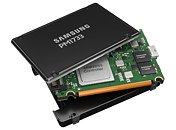Thursday, August 8th 2019

Samsung PM1733 SSD and High-Density DIMMs Support AMD EPYC 7002 Series Processors
Samsung Electronics, Ltd., has taken its leadership position in the memory market a step further today by announcing support of the Samsung PM1733 PCIe Gen4 Solid State Drive (SSD) and high density RDIMM and LRDIMM dynamic random access memory (DRAM) for the AMD EPYC 7002 Generation Processors. AMD launched the 2nd Gen AMD EPYC processor in San Francisco yesterday.
"AMD has listened to the needs of its customers in developing the 2nd Gen AMD EPYC processors and has worked closely with us to integrate the best of our cutting-edge memory and storage products," said Jinman Han, senior VP of Memory Product Planning, Samsung Electronics. "With these new datacenter processors, AMD is providing customers with a processor that enables a new standard for the modern datacenter.""We're excited and thankful to have partners like Samsung supporting the launch of our 2nd Gen AMD EPYC processors," said Scott Aylor, corporate vice president and general manager, Datacenter Solutions Group, AMD. "With twice the cores, breakthrough performance and embedded security features, all optimized by leadership architecture, customers can now transform their datacenter operations at the pace of their business growth."
The AMD EPYC 7002 Generation Processors are expected to deliver up to 2X the performance per socketi and up to 4X peak FLOPS per socketii over the previous generation. The new processors deliver a consistent, comprehensive set of I/O, memory and security features across 8-64 "Zen 2" cores.
Samsung's PCIe Gen 4-enabled PM1733 SSD will have double the throughput capabilities of current Gen 3 SSDs, giving it the highest performance of any SSD on the market today. It reads sequentially at 8.0GB/s and randomly at 1500K IOPS, while offering capacities up to 30.72TB for U.2 (Gen 4 x4) configurations and 15.36TB for the HHHL (Gen 4 x8) form factor. The drive is produced with Gen5 512Gb TLC V-NAND.
The PM1733 drive will be available industry-wide this quarter in both U.2 and HHHL variants, and will be backward compatible with PCIe Gen 3 architectures, providing exceptional flexibility for existing and future server applications. The drive also features Dual Port capabilities to support storage as well as server applications.
In addition to Samsung's PM1733 SSD, Samsung has provided its full lineup of RDIMM and LRDIMM DRAM products for AMD EPYC 7002 Series Processors. Using component architectures of 8Gb and 16Gb DDR4, Samsung is able to offer DIMM capacities ranging from 8GB to 256GB. With Samsung high density DIMMs, users can tap into as much as 4TB of memory per CPU.
"AMD has listened to the needs of its customers in developing the 2nd Gen AMD EPYC processors and has worked closely with us to integrate the best of our cutting-edge memory and storage products," said Jinman Han, senior VP of Memory Product Planning, Samsung Electronics. "With these new datacenter processors, AMD is providing customers with a processor that enables a new standard for the modern datacenter.""We're excited and thankful to have partners like Samsung supporting the launch of our 2nd Gen AMD EPYC processors," said Scott Aylor, corporate vice president and general manager, Datacenter Solutions Group, AMD. "With twice the cores, breakthrough performance and embedded security features, all optimized by leadership architecture, customers can now transform their datacenter operations at the pace of their business growth."
The AMD EPYC 7002 Generation Processors are expected to deliver up to 2X the performance per socketi and up to 4X peak FLOPS per socketii over the previous generation. The new processors deliver a consistent, comprehensive set of I/O, memory and security features across 8-64 "Zen 2" cores.
Samsung's PCIe Gen 4-enabled PM1733 SSD will have double the throughput capabilities of current Gen 3 SSDs, giving it the highest performance of any SSD on the market today. It reads sequentially at 8.0GB/s and randomly at 1500K IOPS, while offering capacities up to 30.72TB for U.2 (Gen 4 x4) configurations and 15.36TB for the HHHL (Gen 4 x8) form factor. The drive is produced with Gen5 512Gb TLC V-NAND.
The PM1733 drive will be available industry-wide this quarter in both U.2 and HHHL variants, and will be backward compatible with PCIe Gen 3 architectures, providing exceptional flexibility for existing and future server applications. The drive also features Dual Port capabilities to support storage as well as server applications.
In addition to Samsung's PM1733 SSD, Samsung has provided its full lineup of RDIMM and LRDIMM DRAM products for AMD EPYC 7002 Series Processors. Using component architectures of 8Gb and 16Gb DDR4, Samsung is able to offer DIMM capacities ranging from 8GB to 256GB. With Samsung high density DIMMs, users can tap into as much as 4TB of memory per CPU.

7 Comments on Samsung PM1733 SSD and High-Density DIMMs Support AMD EPYC 7002 Series Processors
Obviously not a consumer product, but even so...
www.anandtech.com/show/14728/phison-previews-nextgen-ps5018e18-pcie-40-ssd-controller-up-to-7-gbs-nvme-14
I guess maybe you're not old enough, but the "king" has fallen so many times in the tech market that it's an argument I never buy.
Yes, they might've been the leader so far, but for one, this is not a consumer PC centric drive, it's for servers and it's been designed for fast read operations more than anything else. I have a feeling it will be a turd for running consumer type program on.